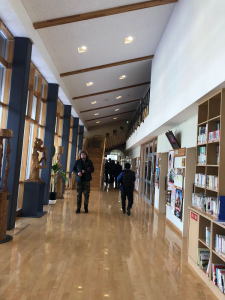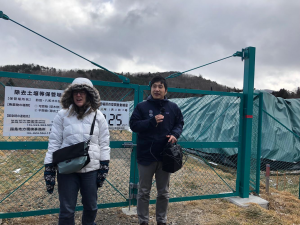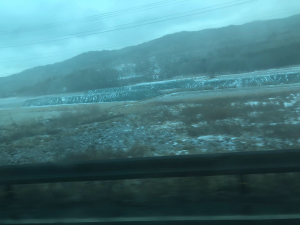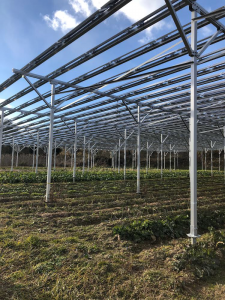When we got on the bus to go to Fukushima, the atmosphere was very different than normal. There was no squabbling about leg room or people announcing loudly that they were about to sleep for the whole time, instead there were whispers and everyone seemed very introspective, unsure of what was to come. When we got to Iitate I was surprised. For the most part it looked like a normal town, perhaps a bit sleepier, and with fancy new government funded buildings standing in front of large piles of bags covered by tarps. Inside these buildings, a community center and a rest stop, they were a bit desolate and the mood was still somber. KTP told us that the buildings were essentially bribes from the government as an apology for the disaster and radiation.
Inside the new community center. Source: Rachel Marshall
We stopped to look at some of the piles of bags filled with irradiated soil that had been scraped off to try to make the land safe and viable again, still obvious under their green and gray tarps, and discussed the sign that said “temporary temporary storage” even though the government has no plans to move them or any place to move them to. We were all struggling to process the extent of the disaster and how there are no solutions except to wait for years until there is no more radiation.
Sign announcing radiation levels and the temporary temporary storage. Source: Rachel Marshall
Bags of irradiated soil covered by tarps. Source: Rachel Marshall
When we sat down for lunch and a presentation, we were all bracing ourselves for personal stories of the disaster and the unimaginable struggles after. Instead, we got something incredibly inspiring that I find myself excited about even days later. We learned about the Iitate Electric Company, who came up with the concept of solar sharing which builds solar panels elevated high enough over farmland to allow tractors to pass underneath. The plants still get enough sun, the farmer gets money from the power company renting the land, shareholders in the company get money, and the sustainable energy gets sold into the energy grid. They still have goals they are working towards, like getting more of the shareholders to be from the town rather than from Tokyo so that the decision making and the money helps to revitalize the town. They also travel to other communities whom they think would especially benefit from it to pitch the idea, including places in Mali. To me this is a perfect example of Avenell’s idea of thinking locally, acting globally. These are individuals who have taken this disaster that is unimaginable to me, that completely overturned their lives, and answered with a real, usable solution that not only offered an alternative to the nuclear energy they are opposed to but also has a positive impact on themselves and their community. Beyond just helping themselves, however, they realized that this idea could benefit other communities as well and are working to spreadand implement it in other places. They came up with a local solution that they are now taking global in a way that will help individual areas as well as the world overall by being sustainable. I was very thankful for the trip, because while it gave me a glimpse into a piece of the devastation people had suffered, it also gave me hope.
Field of crops using solar sharing. Source: Rachel Marshall




Recent Comments